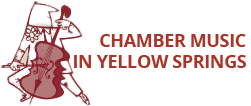Review of the concert by Joan Champie
The Calmus Ensemble presented a memorable evening of vocal music on Sunday, January 22, for the third program in the Chamber Music of Yellow Springs 2016-2017 concert season. This program was a stimulating change from the predominately string ensemble offerings, and the large audience reflected this novelty.
Members of the Calmus group are graduates of the prestigious St. Thomas Church Choir School in Leipzig, Germany, and this background was evident in their unified interpretations of the music. The program was entitled \”All the World\’s a Stage.\” To commemorate the 400th anniversary of Shakespeare\’s death, the selected pieces were based on the plays of Shakespeare or, in the case of the Sonnets, quoted them verbatim. Composers ranged from Orlando Gibbons of the late 16th century and Henry Purcell of the late 17th century to contemporaries such as Ralph Vaughn Williams of the early 20th century. As a result, there was a range of styles and effects: traditional harmonies and melodies, or dissonances and more angular melodies. Of special interest were the four selections of \”Full Fathom Five\” from The Tempest, with composers across a 300 year span of musical compositions. Songs were inspired by the plays Twelfth Night, a Midsummer Night\’s Dream, Cymbeline, the Tragedy of Othello, as well as by Sonnets 3, 18, 54 and 75.
The five members of the Calmus Ensemble sang as with one voice, always with exceptional balance and intonation. They approached each song with the appropriate spirit for the words. Songs from the Midsummer Night’s Dream were especially notable for their effervescent charm and whimsical effect, whereas the song \”Come Away Death\” from Twelfth Night was appropriately somber, dark and haunting. In solo passages, each singer demonstrated a rich, round tone quality, and together they maintained an elegant and pure sound. Using little to no vibrato, the vocal quality was evident. Many of the modern compositions had vocally challenging elements: close harmonies, dissonant chords to resolve (or not!), unusual intervals for singing. All were accomplished with musical skill and facility, seemingly effortlessly. The long soprano solo was beautifully sung with even a repeated large interval maintaining grace. The counter tenor\’s unique vocal quality added special resonance to the quintet, and his solo was lyrical and lovely. Each member had moments to shine individually, but most memorable were the flawlessly warm, controlled, absolutely fine sounds of the group as a whole. Singing of this quality is a great and rare pleasure for the listener.The audience\’s enthusiastic response to this excellent program prompted an encore, and the group responded by singing a five-part Bach Fugue. Each voice had a technically challenging and intricate line to unite in the Fugue, and the ensemble sang with breathtakingly wonderful skill and beauty. This ended the evening in a joyous, full-voiced romp.
The pre-concert lecture was given by James Johnston.
